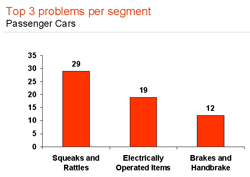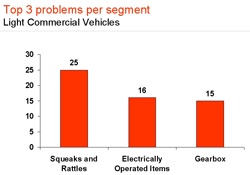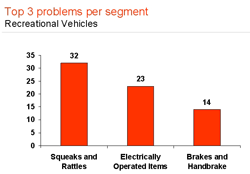
The makings of a quality vehicle
Synovate has announced the winners of the Synovate Quality Awards for Product Quality. Looking at the problems that customers are most commonly reporting, it appears that any major problems with reliability are a thing of the past.

“The production of vehicles has certainly evolved,” explains Richard Rice, Client Services Director at Synovate. “Looking across the segments, squeaks and rattles are by far the most common problem, followed by issues with electronically operated items. This is compared to a low count of mechanical and performance problems. What this means is that vehicles are now far more reliable from a mechanical point of view and that other issues that do not necessarily impact on the basic reliability of vehicles are becoming more important to consumers.”
There are a host of reasons why squeaks, rattles and electronically operated items are the most reported. “First, this is due to the amount of technology that has been introduced in to cars these days,” explains Rice. “The simple fact that there is far more technology in vehicles today implies that there is more that can go wrong. Even entry level vehicles are packed with technology which luxury vehicles have vast arrays of ‘state of the art' features and electronics.”
The high reported number of squeaks and rattles is related to the decreased number of other faults. In the absence of bigger and more pressing problems, such as one's brakes for example, a rattle is going to be a noticeable problem. However, because they are not top priority and therefore do not get fixed immediately, there is typically a higher degree of irritation involved as the problem is bound to continue on for a longer time. “Whilst customers will immediately take their vehicle in to repair a ‘safety critical item, they will often wait until the next scheduled service to have a squeak or rattle repaired.”
“Another reason for the high incidence of squeaks and rattles may be due to the fact that these do not get reported against the warranty information of vehicles” continues Rice. “Correcting these types of problems does not necessarily require new parts, manufacturers do not receive enough feedback about these problems to recognise that a certain model presents the same problems time and time again and therefore they are not always able to ensure that they are attended to before selling the vehicles.” Essentially these problems can be hidden for a longer period of time compared to mechanical or safety critical items.”
What impacts on vehicle quality?

South African vehicles are unique in terms of product quality mostly because of the conditions in which cars are driven here. South Africans work their vehicles hard. In most European countries, public transport is used as a means to get to and from work and typically a vehicle is reserved for weekends. Here vehicle owners their cars to get to wherever we are going, seven days a week for a few hours a day (considering both the distances we travel and the traffic we endure).
Added to this is the inconsistency in terms of temperature and road conditions. Drivers can literally drive their cars through chilly conditions and blazing heat within a few hours, depending on the time of day. What this means for our cars is that their parts are forever condensing and expanding, again translating into more wear and tear.
Roads range from perfectly tarred roads on the major highways; to old roads in the suburbs; to poorly maintained roads in ‘townships' where little money was invested in the road infrastructure in the past. Driving on these varying surfaces obviously has an effect on vehicle quality.
What will define a real quality vehicle going forward?

“Now that the mechanical faults are primarily out of the way,” explains Rice, “it is necessary for dealerships and manufacturers to find out what will really make their customer happy after a service. There is no noticeable difference to a vehicle these days after it comes back from a service and so that ‘feel good factor' is dependent on how you delight your customer by getting rid of the seemingly insignificant squeak, for example.”
“A final issue is that of ‘user error', says Rice. “We are well beyond the era of ‘knobs and buttons' and drivers need to be properly educated on how to operate the plethora of electric functionality that today's vehicles offer. In some instances, vehicle owners can report a fault with a particular item when, in fact, they are not operating it correctly. This makes the comprehensive handover of a vehicle and an explanation of all of the features an uncompromising must before the vehicle leaves the showroom floor.”
Vehicle consumers are far more discerning than they used to be. While manufacturers have done excellent work in the arena of product quality, in some ways they have made it difficult for themselves to delight customers by continually upping the standards. Feedback on, and attention to, every tiny detail is now what defines a quality vehicle.
Ipsos is an innovative, entrepreneurial, client-focused organisation, providing research services to clients on a global basis. We set ourselves high standards and aim to work collaboratively in partnership with our teams in order to service our clients most effectively.
- Unlocking the value of creativity in advertising: How to bridge the creativity gap15 Apr 13:47
- 4 habits keeping your brand poor26 Mar 16:08
- Understanding consumer mindsets for growth in 202407 Mar 08:52
- South Africa's unemployment nightmare: The burden on its people09 May 10:05
- Global survey shows shrinking trust in internet29 Nov 10:17












